

Www.tompkinscountyny.gov. The Open Focus Brain: Breaking the Addiction to Narrow Focus. How memories form and how we lose them - Catharine Young. Memory: It isn’t just something, it's everything.
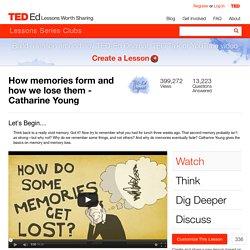
And although scientists have pursued and puzzled over it for centuries, a definitive explanation of the actual memory process still eludes us--partly because our brain is so incredibly complex (it is made up of approximately 90 billion cells after all!). Let’s take a look at the basic neuroanatomy elements, which makes memory possible. Brain cells, called neurons are the core component of the nervous system and have the remarkable ability to communicate with each other and transfer information. They are able to accomplish through a process called synaptic transmission. Neurons release specialized proteins called neurotransmitters that travel through the space connecting each other together called synapses, and bind to specific proteins called receptors.
In order for new memory formation to occur, information needs to undergo certain processes. Memory can go through several different stages before it stored long-term. Would you opt for a life with no pain? - Hayley Levitt and Bethany Rickwald. 3 tips to boost your confidence. Need greater understanding of the fixed and growth mindsets?
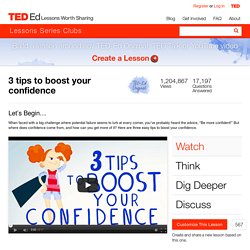
How stress affects your body - Sharon Horesh Bergquist. Let’s take a closer look at how the stress response works.
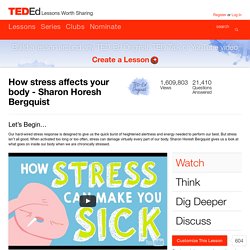
When your brain senses danger, your amygdala, the part of your brain that helps with emotional processing, sends an alarm signal to your hypothalamus. Acting as command central, your hypothalamus activates your sympathetic nervous system. This part of your autonomic nervous system leads to the release of adrenaline (also known as epinephrine) from your adrenal glands into your blood stream. All this happens in a split second. After adrenaline subsides, the second phase of your stress response kicks in. There are two parts to your stress response—turning it on and turning it off. Without the latter relaxation phase of the stress response, stress can spiral into a chronic state. Stress can even take years off your life.
Fortunately, you can dampen your stress response by changing how you perceive a stressful event. Detention or Eco Club: Choosing your future - Juan Martinez. Who was Confucius? - Bryan W. Van Norden. The philosopher Karl Jaspers said that Confucius, Jesus, Socrates, and the Buddha were similar in that each was an “axial figure” in one of the world’s great philosophical or religious traditions, yet we know almost no indisputable facts about any of them.
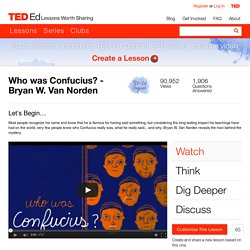
Consequently, almost everything about the life of Confucius (as with Jesus, Socrates, or the Buddha) is controversial. Most of the quotations you hear attributed to Confucius are made up. Consequently, if you want to know what Confucius actually said, read him yourself. One of the most influential translations of the Analects was by the Victorian-era missionary James Legge. You can read Legge’s translation alongside the original Chinese text online. Confucius’s lifetime was in the Spring and Autumn Period, an era in which China was divided into a number of states vying for supremacy. Along with Buddhism and Daoism, Confucianism is one of the Three Teachings of China, its three most influential religious and philosophical systems. Different ways of knowing - Daniel Tammet. 3 things I learned while my plane crashed - Ric Elias. What "Orwellian" really means - Noah Tavlin. On positive psychology - Martin Seligman. Seligman believes that there are three different types of happy lives: the pleasant life, the engaged life, and the meaningful life.
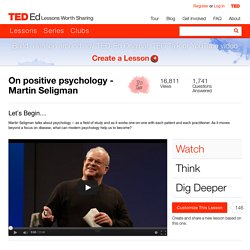
Create an infographic explaining the three lives. The infographic should include a spokesperson who seems to represent each type of life; this could be someone you know, celebrity, a historical figure, or a character from TV, movies, or literature. Try what Seligman calls the “Gratitude Visit” [16:53]. Keep a written journal or a video diary to record your feelings before and after the exercise.
The art of choosing - Sheena Iyengar. Iyengar offers Burger King and Starbucks advertising as evidence for her argument that “Americans tend to believe that they’ve reached some sort of pinnacle in the way they practice choice.
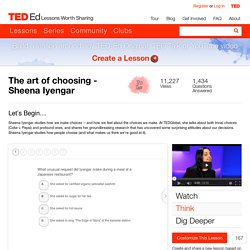
They think that choice, as seen through the American lens, best fulfills an innate and universal desire for choice in all humans.” How people rationalize fraud - Kelly Richmond Pope. How false news can spread - Noah Tavlin. The term “circular reporting” likely originated in the government and military intelligence community, where ascertaining the validity of information is absolutely critical when there is misinformation intentionally being spread and leaked by one’s opposition.
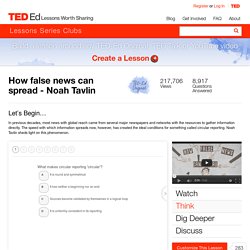
This paper goes into greater detail about how the military intelligence community deals with circular reporting. Sometimes, false information can spread so widely that it becomes accepted as true. The language of lying - Noah Zandan. Detection deception experts such as Pamela Meyer, in her popular book Liespotting argue that there are behavior cues everyday people can use to spot lying.

Hear Pam discuss her book and ideas at this NPR link on the TED Radio Hour and listen to: Can You Spot A Liar? Scroll down at this site and check out the related story links. Click here and see some of the common clues that a lying person might give away that would allow you to detect that they are deceiving you. But a host of reputable scientists, like John Fuerdy of the University of Toronto, question the efficacy of lie detectors: "Studies have long shown that polygraphs are remarkably unreliable, particularly for screening job applicants.
As early as 1965, a congressional committee concluded that there was no evidence to support the polygraph's validity; a 1997 survey in the Journal of Applied Psychology put the test's accuracy rate at only 61 percent.